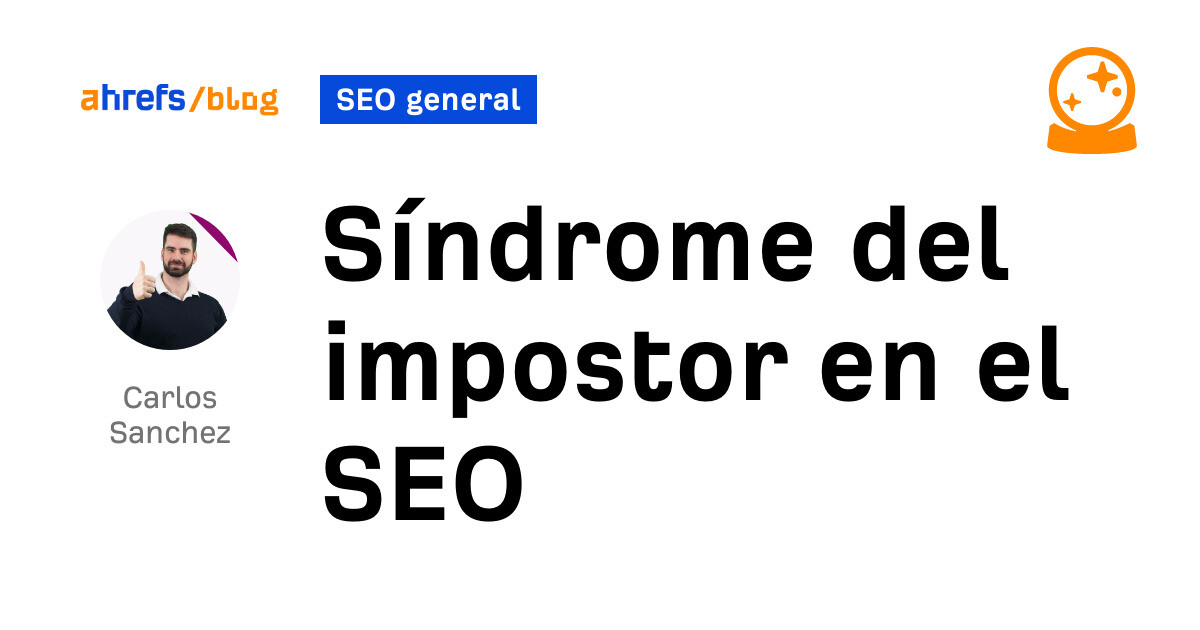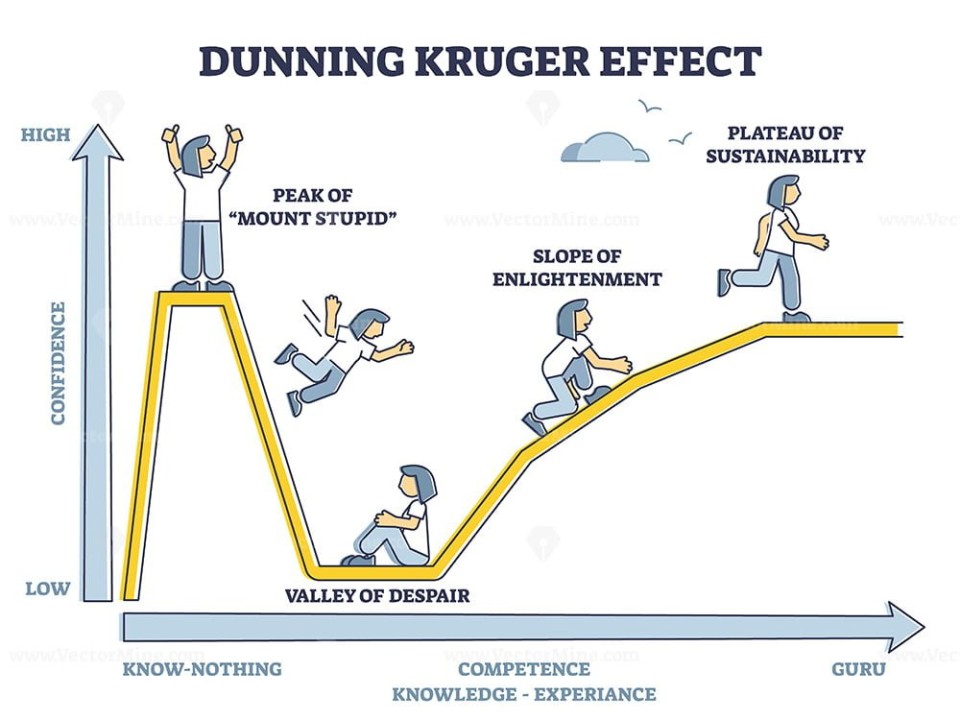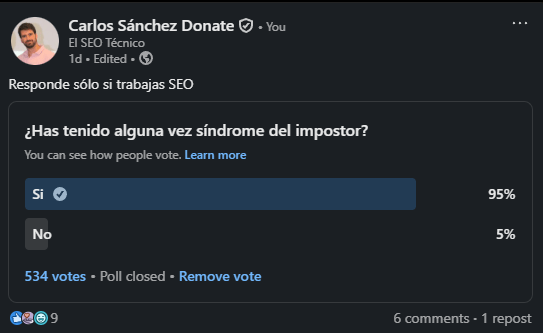Understanding impostor syndrome in SEO and how to overcome it.

SEO in Spain started emerging around 2003-2005. In 2008, it began appearing as a topic in online marketing conference presentations, and it was around 2011 when the first SEO-specific events emerged. Since then, it hasn't stopped growing.
Being optimistic, we're talking about a sector that has at most 22 years of history in Spain. Currently, in the most closely related official training programs—such as the Higher Degree in Marketing, the Higher Degree in Web Application Development, or the University Degree in Marketing—SEO is barely mentioned, and at best occupies just one page within the curriculum of some subject.
This means that our sector today is quite peculiar. There's no official training that provides state certification that someone knows SEO, which has led to a proliferation of completely private training programs (including my own SEO master's program) throughout the sector due to the need for workforce. And yes, despite the continuous attempts to kill SEO, we're still in a wave where there's more job supply than work demand.
It's very easy to verify that most current SEOs come from very diverse backgrounds, converting to this sector quickly either by finding their true professional calling or because it was a great opportunity during a time of job necessity.
While an entire industry has been quickly built around ranking websites in search engines, the lack of "official sources" beyond Google's documentation has left many people quite disoriented. Until now, the industry has been sustained by curious and self-taught people, which differs from other more common sectors where there's a much clearer standardization of processes and knowledge.
This isn't inherently negative or positive, but in the topic of this article—impostor syndrome—it plays an important role. It seems that impostor syndrome is quite a recurring issue that affects a large part of the community.

To discuss how impostor syndrome affects SEO, it's interesting to define what it consists of and what its possible causes are. From these points, quite interesting debates can be formulated.
Impostor syndrome is a psychological phenomenon in which a person, despite having objective achievements, capabilities, or external recognition, feels they don't deserve their successes or even their job position and is afraid of being a "fraud."
I know not everyone has impostor syndrome; there are people who genuinely don't have the knowledge or skill, or even those who deliberately defraud by doing bad practices or working on things they don't actually know how to work on. In this article, we focus on this syndrome, and I want to provide depth to the explanation of why it happens so much in this sector.
The causes for this syndrome (which is not a disease, but rather a pattern of thoughts and emotions that can affect self-esteem and therefore mental health) can be personal factors, professional factors, and social factors.
Since I'm not a psychologist, I'm going to approach the topic from the area I know and have experience in, professional factors, where I'm able to identify common patterns.
All the points of professional factors that can be related to impostor syndrome exist within SEO, so let's break them down little by little.
All of us who have been in the sector for a while are clear about which training programs can be useful and which only serve to waste time. We're clear about which training programs are references and the opinions of other colleagues in the sector about them. However, when someone starts from scratch, it's difficult to separate the wheat from the chaff.
Many beginners opt to look for official training, which doesn't exist, and what they find are official universities with unofficial training (real universities with non-university degrees). Training that, despite their prices, doesn't even reach the quality of free videos you can find on YouTube.
This makes it difficult to know where to start, especially if you've started your job as an SEO and are thinking about training yourself to work efficiently.
If the person hasn't had anyone to accompany them when performing their tasks, there hasn't been proper measurement of the evolution of their strategies (remember that what isn't measured can't be improved), it's difficult for that person to know if they're doing their job well, especially if there's no internal or external validation.
Good training can help you be clear that you have the knowledge to work professionally, but as I mentioned, it's very difficult to know where to start and choose appropriately. The lack of official status and poor training are possible reasons why there's so much impostor syndrome in the sector.
In this sector, it's very complicated to measure work experience. Considering that it's a field where everything is constantly changing, it's likely that someone with a year and a half in the sector is more efficient than someone who dedicated 5 years to it but hasn't practiced for 2 years.
Measuring experience in time (as happens in other sectors) is complicated, because SEO is very qualitative. So if an "SEO" has been working for 8 years without applying strategies, only doing KW Research, completing the ALT tags for images and adding metadata, perhaps that experience isn't as useful, because despite the importance these tasks may have in SEO, web positioning is much more than that.
It's almost more important to know what types of projects you know how to work on (both the website's technology and the project's sector) than the amount of time you've been working in SEO.
This creates a somewhat different paradigm from typical sectors, since there isn't such a direct correlation between time worked and experience, making it harder to objectify. And it's even common to find people with many more years of experience in the sector than others, yet this isn't as reflected in skills and knowledge. This can cause certain crises like:
— This person has been in the sector for much less time than me and yet I see them more comfortable. Does that mean I'm not professional or that I'm doing my job poorly?
— These people with the same experience as me talk in depth about issues I don't even know superficially. Could it be that this isn't for me?
We tend to undervalue what we know and assume that others know it too, and we compare ourselves a lot with others, when everyone has a very different path and experiences.
And the problems aren't only for those who have been in SEO for a while; they happen from the beginning. When you start in this sector, it's common to think you were given the position by chance, even more so when you haven't previously trained in it.
The support your first company gives you is vital; not only does what they teach you directly matter, but also how professional the company itself is at working on SEO.
Some companies can only serve to lower your self-esteem. Especially if their business model isn't really doing SEO for clients, but getting clients by volume. If in the company where you work you handle more than 10 clients (to put a number on it) at once, it's very likely you'll feel like a fraud because what you apply rarely works.
The reality is kinder in this case; there are companies that don't provide the necessary resources for a project to work and move forward. Whether in time or training. However, many in that situation wonder if SEO really works or if they just don't know how to apply it. Sometimes it's not that you don't know, but that they don't allow you to work properly.
We live in an era, even more so since ChatGPT exists, where everyone knows about everything. A vast majority speaks in absolute terms, as if they were establishing doctrine or had an indisputable reason, even if they haven't verified it or have no knowledge whatsoever of the topic they're discussing. Sometimes they even contradict each other; other times they talk about totally irrelevant topics as if it were what would most benefit a business.
Exactly, I'm talking about the famous snake oil salesmen.
How do you distinguish, if you're new, the good from the not-so-good? If you're a sponge and need to learn everything, you might learn things that can be counterproductive.
However, since everyone on social media talks about their great successes and rarely about their blunders, it's easy for you to have a distorted perception where everyone's projects work out well and yet you're the only imperfect person.
SEO is trial and error; by definition there are strategies that don't work, core updates that hit hard, and even occasions where the client doesn't help you help them. But it's less marketable for attracting clients to publicly say you've had difficult clients.
Having a stream of information about positive experiences with names and surnames and some anonymous failures, which sometimes even turn into success stories, you end up generating high expectations for yourself.
This affects even more in this sector where although there's "pie for everyone," we find ourselves in a zero-sum game. If you are first for a certain keyword for a certain audience, it means someone else isn't, and that with luck they're second. So it's not just about doing your job (which is bringing relevant traffic to the website). To achieve it, whether we like it or not, there are things you have to be better at than others.
This pressure makes many feel very small, being another possible cause of the "impostor syndrome epidemic."
Once someone is working in SEO, from what point can they consider they know enough to be a professional? It's a difficult barrier to define and one that disturbs many colleagues.
The more you learn in the sector, the more aware you become that you'll never learn it all. That's why there are several specialties, and within those specialties the issue varies depending on the sector in which it's found.
The real answer is that nobody knows everything about SEO, first because there are matters where there's no standardization and it's variable, the complexity and depth it has, and on top of that you have to continuously update yourself.
This causes the most self-demanding people to never consider they know enough to be considered "qualified" or "worthy" of calling themselves SEO.

Dunning Kruger Effect. IMG source: Prof Rory Dunn
The Dunning Kruger effect can illustrate quite easily one of the possible explanations for why this happens so much in SEO.
The Dunning Kruger effect implies that at the beginning of knowing any discipline, however little it may be, it seems like a lot and anyone is an expert. At the "Peak of Mount Stupid" we can find a large number of people who, without having made mistakes in SEO, consider it easy because they've learned how titles work and have heard the acronym HTML.
Then we find ourselves with the "Valley of Despair" and "the Slope of Enlightenment," and the real issue here is that we find ourselves in an unconventional sector. Where established values can change radically from one day to another. Sometimes with quite a bit of sense if you know the basics of SEO and understand how it's evolving, and other times "seemingly" arbitrarily.
This causes you to constantly have to doubt what you don't yet know, but continuously verify what you already know; you can never take anything for granted. Whether due to Google updates, statements from Google representatives, or tests by colleagues and/or your own. Creating the feeling that you never know enough since what you learned yesterday may not be true tomorrow.
So we're left with this curious landscape in the sector:


Before concluding, I'd like to share the opinions of some of my colleagues in the sector:
If you're starting in SEO or working on it, nobody is born knowing this—it's learned, and it's continuous learning that constantly changes. Learn, try, and test your hypotheses; it's about putting things into action, not just learning theory. You'll gain confidence and achieve results.
Nobody has fully decoded the algorithm, so nobody has the absolute truth. This is relative and constantly changing, so you must adapt to change. Don't be afraid to try and share your results.
As SEOs, we're not infallible. Learn from your mistakes, experiment with your own resources—nobody will do it for you. Don't be afraid to make mistakes. If a strategy didn't work, change course and keep looking for the best way to achieve your results. — Andrea Dominguez

When I go to events or conferences, the question I'm always asked the most is: how did you become Puma's SEO? A German brand, present worldwide, with 76 years of history that's been worn by some of the world's best athletes, hiring a 28-year-old girl from a town in Valencia. Of course I had impostor syndrome when I did the first interviews, and there were tools or CMS that I'd never used in my life. But then they told me they'd been searching for over a year for a profile like mine: 100% specialized in SEO, nearly bilingual English, and passionate about sports. That "easy." So I say it in talks: anyone with the desire to learn and motivation can reach a position like mine. And as mini advice, I'd say it's 200% essential to study English and spend a few years at an agency where you immerse yourself in all kinds of projects and professionals who know more than you. — Lorena Romero

Impostor syndrome isn't a bad thing—on the contrary, it's a sign that you're moving forward. In the SEO world, there are so many different areas—from local SEO to strategy to technical SEO, news, or specific platforms—that it's impossible for one person to know everything. Feeling that "I don't know enough" helps you recognize your limits and drives you to keep learning. What's important is that it never stops you. Get out there, participate in spaces like SEO Office Hours, and share what you already know. Only then will you discover how far you've already come and, moreover, learn from those who are one step ahead on that path. — Dani Leitner

"When you start your first job or when you get promoted to a position with greater responsibility, there's usually a certain period when you feel the job is too big for you. After that initial period, you realize you're perfectly capable." — Lino Uruñuela

Three quick tips: One, learn to identify it—ask yourself if those intrusive thoughts are legitimate or just Mr. Impostor. Two, look back—recognize your journey, your evolution, and your growth. And three, share—just talking about it out loud will help you get another perspective outside your head, and you'll see it's more common than you think. — David Carrasco

It's completely normal to feel a bit of impostor syndrome in any profession, but in ours particularly, I think it's accentuated by the numerous social media posts that, to attract attention, boast about results without context, or claim that SEO is dead and now what works is TikTok, GEO, AIEO, or whatever's trending that day. I recommend putting all that in perspective, not paying much attention to what you see on social media, and above all, not letting it make you doubt the work you do every day. — Juan Gonzalez Villa

Impostor syndrome is that voice that says your achievements aren't your merit, but simply luck. Luck is just one more variable in the process: from finding employment when there are more vacancies, to a professional in the sector you don't know trusting you for a project. But what's truly decisive is that when that opportunity arises, there's preparation on your part behind it. If not, the train will pass you by.
As in any other discipline, there will always be professionals who know more (and less) than you. Recognizing this means you're self-critical and aware of the complexity of the field you work in. SEO, moreover, is a very dynamic sector that experiences constant changes and updates—it's natural to doubt. What's important isn't having all the answers, but maintaining curiosity and the desire to keep moving forward. Continuous learning and adaptability are key for an SEO professional. It's necessary to train yourself, experiment, read articles, stay up to date... and not get stuck in obsolete practices, or else you run the risk of being left behind. — Rosario Aznar
In SEO, a discipline for curious people, two very opposite profiles come together (among others): those who don't mind flaunting their ignorance and those who have impostor syndrome.
The reality is that within SEO it's impossible to know everything, and this causes insecurities in people who have a high level of self-demand.
The bad news is that you'll have to learn new things almost daily to stay in the sector, and when you stop doing so, you'll fall into overconfidence.
The question here is: Do you know how to make a website improve its results, have more visibility, and attract new clients who wouldn't have been obtained without implementing these changes?
If you know how to do it, without further discussion I must tell you: Congratulations, you're an SEO.
I currently offer advanced SEO training in Spanish. Would you like me to create an English version? Let me know!
Tell me you're interested